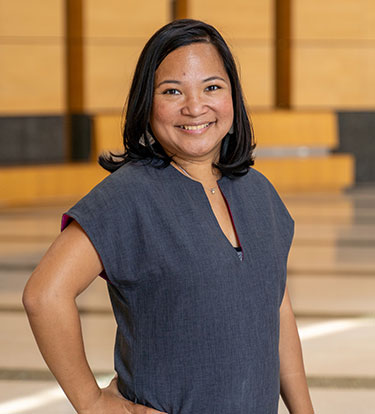Strategic Directions: Leadership & Capacity Building
Quick Links
York University strives to be a community where all members demonstrate the knowledge and skills necessary to navigate through and lead in a diverse world. York commits to building capacity in its leadership to advance EDI for today, tomorrow and the future.
Advancing DEDI requires leadership. Building capacity to lead is critical and includes support for a culture where DEDI is integrated into everything the University does, including a conceptualization of leadership as collaborative, relational, and responsive to members of the community. Opportunities will be provided for education and training, leadership development, building communities of practice, developing toolkits, support from institutional leadership, and building mechanisms for accountability.

Ethel Tungohan, PhD
Canada Research Chair in Canadian Migration Policy, Impacts and Activism (Tier 2), Associate Professor, Department of PoliticsRecommendations for new Campus-Wide Initiatives
- Build a vibrant campus network (community of practice) of professionals across the University who undertake DEDI work. The Centre for Human Rights, Equity and Inclusion (CHREI) will continue to expand its programs and activities designed to support these professionals, facilitate collaboration, share and further enhance their work individually and collectively. The CHREI will develop leaders throughout the institution, matching their commitment with the skills required to shepherd real and lasting progress in individual units.
- Further develop DEDI education programming for leadership at all levels to deepen understanding and encourage modelling of inclusive and equitable behaviour and practices, with a focus on applied skills and performance management in diverse workplaces. To be led by Human Resources and Faculty Affairs in the Division of Equity, People and Culture.
- Consult, develop and implement guidelines and toolkits for decision-making, policy writing, and program development that incorporate DEDI principles.
- Create a new advisory council on DEDI, building on the work of the current President’s Advisory Council on EDI and the President’s Advisory Committee on Human Rights and their sub-committees.
- Develop leadership development programming to support underrepresented equity-deserving employee groups, to be led by Human Resources and Faculty Affairs in the Division of Equity, People and Culture.
Recommendations for continuing initiatives
- Continue to identify and resource DEDI strategic initiatives through existing budget processes as one of the University’s key values.
- Continue to resource, develop, implement, and evaluate comprehensive education and training programs on DEDI for students, faculty, instructors, and staff. Embed this education and training in recruitment processes, onboarding, assessment and performance reviews, and professional development for staff, faculty and instructors, and in curricular and co-curricular contexts for students.
- Facilitate and continue to provide opportunities for open and respectful dialogue through continued implementation of the recommendations made during the President’s Initiative on Open and Respectful Dialogue. This includes continued efforts to build conflict engagement skills and practices among all members of the York community to equip people for working across differences.
- Review the Work-Study/Student Employee Becoming YU process and program with a DEDI lens and further embed DEDI as a competency and learning opportunity.
- Continue to implement relevant action items in the Action Plan on Black Inclusion, such as those in the thematic areas of Decision-Making and Accountability.
Taking action, making impact
We call on faculties, divisions, units, departments, and individual York community members (including students) to identify and implement actions to:
- Support the training and development of all employees as it relates to DEDI.
- Provide opportunities to foster the leadership skills and knowledge of under-represented Indigenous and equity-deserving groups.
- Create opportunities to foster respectful dialogue across differences and to build conflict engagement skills and practice in community members.
- Create opportunities to share and learn from a diverse range of leadership practices, including, for example, Indigenous leadership practices.
Benchmarks
Understanding that benchmarks will need to be established over time, and the mechanisms put in place to be able to track the University’s progress, the following benchmarks and/or monitoring systems are recommended:
- Identify and develop metrics to annually monitor employment progression in leadership roles of equity-deserving groups across all employee groups. To be led by the Division of Equity, People and Culture.
- Human Resources and Faculty Affairs, in collaboration with key partners, to regularly evaluate and review DEDI training and education activities to ensure leadership at all levels is given opportunities to increase awareness and understanding of DEDI.